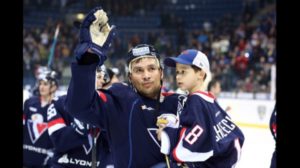Former Sharks right-winger hangs up the skates

By Sam Laskaris
SAN JOSE—Though he had played his final professional hockey game in early 2017, Jonathan Cheechoo did not officially announce his retirement from the sport until earlier this week.
Cheechoo, a member of the Moose Cree First Nation, did not have any intentions to play during the 2017-18 season.
That was a given since his family had flown overseas last year in honour of his final pro game, with Slovan Bratislava, a Slovakian-based squad in the Kontinental Hockey League (KHL).
In a Thursday phone interview with the Anishinabek News from his home in San Jose, Cheechoo said that he didn’t want to announce his playing days were officially over since he was still owed some money from his final KHL season.
“I was just waiting for that,” he said, adding he wasn’t sure whether an official retirement announcement would further delay payment he was owed.
Cheechoo, 37, played 17 seasons of pro hockey. He spent the final four years of his career toiling for three different franchises in the KHL.
The 27-team KHL features clubs in seven countries, but the majority of those clubs (21) are based in Russia.
During his career, Cheechoo played a total of 560 National Hockey League (NHL) contests (including regular season and playoff). He was best known for his time with the San Jose Sharks, where he played 498 games.
Cheechoo also appeared in 62 matches with the Ottawa Senators.
His most productive season was the 2005-06 season. Cheechoo ended up winning the Maurice “Rocket” Richard Trophy that year by scoring a league-high 56 goals.
The right-winger added 37 assists in 82 games that year to end the season with 93 points.
“That was the individual highlight of my career,” said Cheechoo, who grew up on his First Nation located in Moose Factory in northern Ontario. “It’s not something a lot of people do. There’s only one [winner] a year.”
During his career, Cheechoo racked up a total of 340 NHL points, including 186 goals.
Cheechoo is not certain what his future will look like, but he does know he’ll be in his home province soon for the Little Native Hockey League (LNHL) tournament, more commonly known as the Little NHL, which will be held in Mississauga.
Opening ceremonies for the tournament are this Sunday. And games will be held Monday through Thursday.
Cheechoo is the honorary chairperson of the tournament. He held the same title last year. This marks the second consecutive year the Moose Cree First Nation is hosting the event.
As was the case in 2017, Cheechoo’s son Jack, who is now six-years-old, will once again suit up for the Moose Factory squad that is participating in the Tyke division.
Later this month Cheechoo will also be honoured by the Sharks during an on-ice pre-game ceremony on Mar. 24. He will drop the ceremonial faceoff for San Jose’s matinee contest versus the Calgary Flames.
Cheechoo has yet to determine what path to pursue next.
“I’m still trying to figure that out,” he said. “I’m just trying to take some time for myself right now and try to get healthy. I took quite a beating over the years.”
Cheechoo is also trying to spend as much time as he can with his family.
San Jose will continue to be home for the Cheechoos.
“It has been our home base for 12 years,” Cheechoo said. “It’s a good spot for now.”
Cheechoo added his future could possibly include some type of involvement with his livelong sport.
“It’s been a passion of mine for so long,” he said. “I’m not sure what I’d like to do. But I’d like to stay involved in some capacity with hockey.”
Though his own playing days are now over, Cheechoo hopes he can continue to be a role model for other Indigenous hockey players.
“For me, it was something I set out to be,” he said. “When I was a little kid, I wanted to be in the NHL and be a role model. Around my 20s I realized what that entails. And it means a lot to me.”
Cheechoo said there are numerous talented Indigenous hockey players but some of them are reluctant to leave their First Nation behind to pursue their careers.
“I still want to be that role model and show them that anything is possible,” he said.


